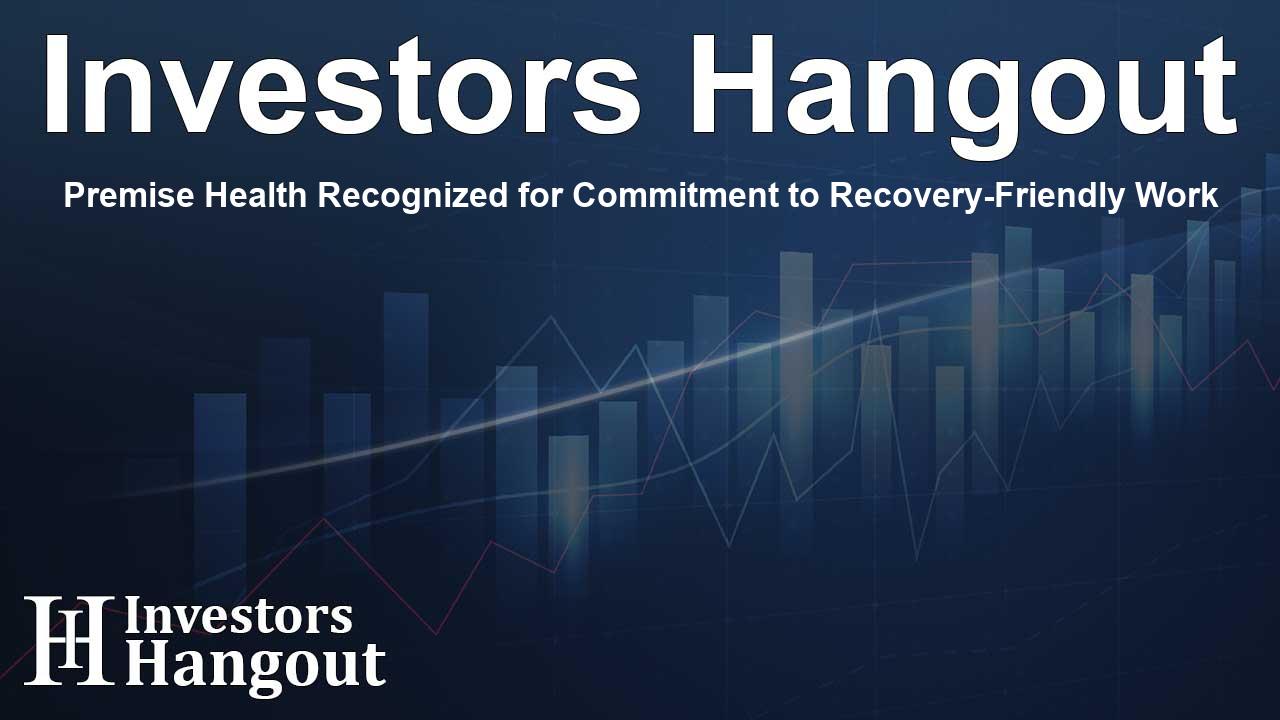Premise Health Recognized for Commitment to Recovery-Friendly Work

Premise Health Achieves Recognition for Supporting Recovery
The achievement underscores Premise Health's commitment to its workforce and enhances its ability to support other employers on their journeys to become recovery-friendly workplaces.
Located in Brentwood, Tennessee, Premise Health has been proudly recognized as a Recovery Friendly Workplace. This certification represents a commitment to fostering a supportive environment for employees who may be affected by substance use disorders. Premise Health is a leading direct health care provider for employers and unions, and this certification emphasizes their stance in promoting employee well-being.
Almost 1 in 5 U.S. adults have experienced substance use disorders, highlighting the importance of this recognition. Employees often navigate challenges related to recovery, and Premise Health aims to create a workplace that acknowledges these needs.
Elizabeth Reimer, Premise's Chief Human Resource Officer, stated, "Premise is deeply committed to building a recovery-friendly workplace for our more than 6,000 team members nationwide. A culture that supports those impacted by recovery is essential to their well-being. When we take care of our team members, they are better equipped to support our clients and members on their own health journeys."
Organizations that attain Recovery Friendly Workplace certification demonstrate proactive leadership in reducing stigma and ensuring access to recovery resources. Premise's approach includes fair chance hiring practices and ongoing employee education, highlighting their commitment to creating a safe and inclusive environment. Employee benefits such as no-cost assistance programs add another layer of support for individuals dealing with recovery.
As Premise cultivates a recovery-friendly atmosphere, they also encourage their clients and partners to adopt similar principles. This initiative not only enhances employee satisfaction but can lead to improved workforce stability and industry leadership. The certification process involves meeting specific criteria related to workplace culture, hiring and retention practices, benefits offered, and educational programs.
In a statement regarding this recognition, Beth Ratliff, Chief Operating Officer at Premise, remarked, "We know that supporting our team members who are impacted by recovery strengthens our team and ultimately enhances the services we provide to our clients and members. I’m proud of our emphasis on well-being and our commitment to helping others in their journeys toward similar initiatives."
Shaw Industries, a long-time partner of Premise Health, was among the first companies to receive this certification. Nikki Sharp, vice president of associate well-being at Shaw, expressed her pride in collaborating with an organization that understands the importance of prioritizing the health of its employees—both physical and mental.
In conclusion, Premise Health's recognition as a Recovery Friendly Workplace highlights their invaluable contributions to fostering an environment where individuals can thrive. The importance of supporting employees with substance use challenges cannot be overstated. Such dedication to workplace well-being not only benefits the employees but enhances the overall efficacy of the organization in serving its clientele.
About Premise Health
Premise Health serves large organizations and their employees with exceptional healthcare options. They partner with commercial and municipal employers, health plans, unions, and tribes to deliver healthcare solutions that meet the needs of millions across more than 800 wellness centers nationwide.
By offering over 30 types of care, Premise Health ensures that members can access quality healthcare that improves their health while also lowering overall costs associated with healthcare services. Premise stands out as a leading direct healthcare provider and one of the most significant digital healthcare providers across the United States.
To learn more about their initiatives and healthcare services, visit Premise Health's official website.
Frequently Asked Questions
What is a Recovery Friendly Workplace?
A Recovery Friendly Workplace is an organization that implements practices and policies that support employees affected by substance use disorders.
Why is the recognition important for Premise Health?
This recognition reflects Premise Health's commitment to employee well-being and their proactive role in addressing substance use issues in the workplace.
How does Premise Health support its employees?
Premise supports employees through fair hiring practices, access to recovery resources, training programs, and various employee benefits.
What are the criteria for achieving Recovery Friendly Workplace certification?
Organizations must meet specific criteria in culture, hiring, benefits, and education to be certified as a Recovery Friendly Workplace.
Who partnered with Premise Health for this initiative?
Shaw Industries is a notable partner of Premise Health that has also achieved Recovery Friendly Workplace certification.
About The Author
Contact Ryan Hughes privately here. Or send an email with ATTN: Ryan Hughes as the subject to contact@investorshangout.com.
About Investors Hangout
Investors Hangout is a leading online stock forum for financial discussion and learning, offering a wide range of free tools and resources. It draws in traders of all levels, who exchange market knowledge, investigate trading tactics, and keep an eye on industry developments in real time. Featuring financial articles, stock message boards, quotes, charts, company profiles, and live news updates. Through cooperative learning and a wealth of informational resources, it helps users from novices creating their first portfolios to experts honing their techniques. Join Investors Hangout today: https://investorshangout.com/
The content of this article is based on factual, publicly available information and does not represent legal, financial, or investment advice. Investors Hangout does not offer financial advice, and the author is not a licensed financial advisor. Consult a qualified advisor before making any financial or investment decisions based on this article. This article should not be considered advice to purchase, sell, or hold any securities or other investments. If any of the material provided here is inaccurate, please contact us for corrections.
